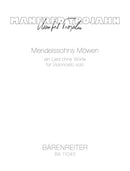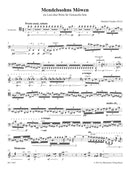| 作曲者 | Manfred Trojahn (b. 1949) |
| タイトル | Mendelssohns Möwen (2012) |
| サブタイトル | A Song without Words |
| 出版社 | Bärenreiter・ベーレンライター |
| 楽器編成 | Solo Cello |
| 楽器編成(詳細) | Vc |
| 品番 | 9790006543229 |
| 難易度 | 上中級 |
| 形状 | 4 ページ・33.5 x 25.5 cm・53 g・Stapled |
| 演奏時間 | 10分 |
| 作曲年 | 2012年 |
| 出版年 | 2013年第2刷 |
| 出版番号 | BA 11043 |
| ISMN | 979-0006543229 |
Manfred Trojahn on the origin and title of his impressive virtuoso solo work:
"Admittedly I do not know if he had seagulls, but since Mendelssohn was born in Hamburg, he will not have gone through life without at least the impression of the cry of seagulls. Nor do I know if seagulls played any part in his life in Rome. I myself was astonished when, one or two years ago in the Villa Massimo, I was, not exactly annoyed but disturbed by the strong rhythmical cry of seagulls. I was just about to write a bassoon solo when the seagulls started.
Then the idea came to me that precisely this sequence of notes could serve as the basis of the work. And the sequence for the bassoon solo is, in turn, the basis of the piece for violoncello - this is how titles are born... Of course the violoncello meanders with virtuosic ease from the seagull motif to the 'elf-like' skittering brought to music by Mendelssohn and used time and again in his compositions, finally becoming a cabaletta. Now, cabalettas are not very representative of Mendelssohn, but as I was composing I definitely wanted to put a cabaletta in this passage.
I am sure Mendelssohn and I will easily agree on this, especially since later justice is done to him in the rapid passages and, of course in the tonal cadenza at the very end, which is more indicative of his time than of mine... isn't it?"





